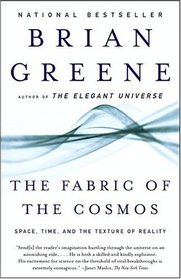Cathy L. (KerrvilleCate) reviewed The Fabric of the Cosmos : Space, Time, and the Texture of Reality on + 203 more book reviews
Helpful Score: 2
Fabulous! Brian Greene really opened my eyes to the possibilities of the newer scientific views of the universe. He asks questions like: "Is the Universe real physical entity or only a human abstraction?" A very readable and fairly easily understandable book.
Helpful Score: 1
This book should be required reading for anyone who lives in the universe. This generation's Carl Sagan wrote it. He may even be a better 'educator of the general masses' than Sagan was.
Greene writes for the non-expert who wants to understand - not just be told, and accept, the analogies - but who wants to be persuaded and actually shown that the universe is the way theoretical physics is the way it is. (Unlike some physics authors I could mention).
He asks the questions I want to ask, and then answers them. Why strings? Why not envision tiny Frisbees, or spheres, or arrays of numbers? He takes the time, walks you through it, without requiring you to follow hard math. He doesn't condescend, and can still see the way people outside of academe think and talk. It's apparently a rare gift to be able to think at the edges of human understanding of space, time, and the true nature of material, but be able to talk to the rest of us.
For instance - in general, I think of the universe as being made of stuff and energy. I used to think of mass as a property of stuff, and this book convinced me that there's no reason it should be a property of one and not the other. Why isn't it a property of light, for instance? Or, more specifically, how could it have a mass of zero? I kind of get it now.
I get general relativity fairly well, I follow what quantum mechanics is about, although I can't accept that something doesn't have a velocity or position until measured, and I now get string theory at the "survey-course" level.
Greene writes for the non-expert who wants to understand - not just be told, and accept, the analogies - but who wants to be persuaded and actually shown that the universe is the way theoretical physics is the way it is. (Unlike some physics authors I could mention).
He asks the questions I want to ask, and then answers them. Why strings? Why not envision tiny Frisbees, or spheres, or arrays of numbers? He takes the time, walks you through it, without requiring you to follow hard math. He doesn't condescend, and can still see the way people outside of academe think and talk. It's apparently a rare gift to be able to think at the edges of human understanding of space, time, and the true nature of material, but be able to talk to the rest of us.
For instance - in general, I think of the universe as being made of stuff and energy. I used to think of mass as a property of stuff, and this book convinced me that there's no reason it should be a property of one and not the other. Why isn't it a property of light, for instance? Or, more specifically, how could it have a mass of zero? I kind of get it now.
I get general relativity fairly well, I follow what quantum mechanics is about, although I can't accept that something doesn't have a velocity or position until measured, and I now get string theory at the "survey-course" level.




